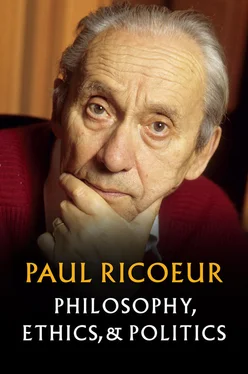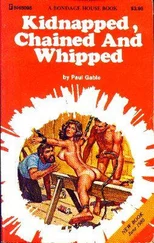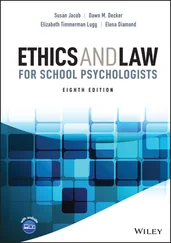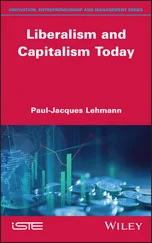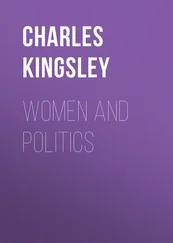The notion of the conflict of interpretations concerns both sides of the opposition. It is not a matter of replacing a conception of evil that is too material or too instinctual with a conception that is more spiritual. The conflict of interpretations gives both sides their due. It is, moreover, a general feature of my work that I always place myself at a crossroad of conflict. I try to move beyond what can be paralyzing in a position that oscillates between two poles, and it is in this sense that each of my books generally takes up what was left unresolved in the preceding one. This forms a chain that is half-chronological, half-dialectical. I never seek a middle or intermediary path. I simply place emphasis on the creativity that language carries. In this, I participated in the “linguistic turn” common to all schools of philosophy in the 1960s and 1970s. At the same time, I transposed the conflict of interpretations into a new framework of reflection, which allowed me to see both sides of the question – the regressive side, which indeed seems to me to be the ground of the human imagination, as well as the prospective side. The human imagination includes both the side one could term nostalgic, and the side one could call prophetic.
That is when I began to deal with the problem of metaphor, which is, to begin with, the problem of replacing an ordinary word with a word that produces an image. Formulated in this way, the topic appears to be limited to the functioning of poetic language. But it seemed to me that metaphor was the focal point of creativity in language. Through this work, I tried to show that language is not simply an instrument employed to satisfy the basic needs of ordinary conversation, nor is it reducible to scientific language, but is amazingly revelatory of the hidden face of things and of aspects buried deep within our experience. Poetic language thus breaks with ordinary language, and even with scientific language. It is not a descriptive language that tells us about reality, rather poetic language reveals aspects of the habitable world that are concealed, as it were, by everydayness or by the manipulability of things.
Do you mean that it is an instrument that goes beyond its instrumentality?
Oh yes! In this regard, I am opposed to another type of reduction, with which I reproach the German philosopher, Martin Heidegger: to have narrowed scientific language to its technological applications, as if technology had swallowed up science! The totally disinterested character of science must be affirmed, in contrast to the instrumental character of technology. And this does not prevent scientific language from “saying” the world under two conditions: the first is conformity with respect to what is observed, the second is conformity with respect to logical coherence. These two rules, observation and coherence, are violated by poetic language, thereby exploding language. In short, I tried to tie the revelatory character of poetic language to its subversive aspect. Scientific language has its logical discipline, and even its ethical discipline. Its demand for rigor grounds the standards proper to it. Poetry is language in festive mode; it expresses aspects of the world and of my participation in the world that I would never have perceived without the profusion and the somewhat delirious character of poetic language. This question was at the core of my book The Rule of Metaphor [ La Métaphore vive ]. 3The adjective “living [ vif ]” is truly important, inasmuch as our everyday language is a huge cemetery of dead metaphors. In this way, the “leg” of a chair or the “saddle” of a mountain pass are no longer metaphors perceived to break with ordinary language, but have been integrated into it. The poet, I would say, is the guardian of metaphors inconvertible into ordinary language.
Time and Narrative is the work that is twin to The Rule of Metaphor. In it, you widen the scope of the creativity of language to the narrative and to its plot, and no longer confine it to metaphor alone. By extending your area of investigation to all texts that are susceptible to multiple interpretations, haven’t you broached the idea that all things human go beyond their simple material existence?
The plurality of meanings is characteristic of basically all language that is not strictly descriptive or logical. In Time and Narrative – second to be born, but conceived at the same time – I considered another side of the creativity of human language: no longer the lyrical side, but the narrative side. My idea was that the construction of plots in the narrative domain displayed the same creative capacity as the invention of metaphors in the lyrical domain. There is thus a parallel between the creative power of metaphor and that of the plot in the narrative domain. This, of course, took me much further than I had foreseen, because the narrative does not simply concern the epic, tragedy, or the novel but also the field of history. I tried to defend the idea that the art of recounting covers a range of narratives extending from fairytales to grand historical narration. Having arrived at this point, my work took off in a new direction. I tried to group together all these approaches and asked myself, in a recapitulative mode in Oneself as Another , what had become of the subject in all this. I attempted to link together the speaking subject, the acting subject, the narrating subject, the moral subject, and the political subject. Who speaks? Who acts? Who recounts? Who is responsible? Who is the political subject? In this way, I came to the idea that the only one who can pose the question “who?” in all other domains is the one who can be a citizen-subject.
I continue to think that your thought eludes any chronological exposition. From History and Truth, first appearing in 1955, to Oneself as Another, published in 1990, Olivier Mongin, the most recent of your biographers, asserts that for you, meaning “sacrificed on the altar of history … has again become a wager.” 4 You have added the work of mourning with respect to the history of the subject to the work of mourning with respect to meaning. Have you not always, and at first just in anticipation, questioned whether one can, at the same time, understand past history and make current history without giving in to the systematizing spirit of philosophies of history?
There is certainly a first level, the level of the history one suffers and of the history one makes. By this juxtaposition I mean to say that I have never abandoned Marx’s formula that man makes history under conditions he has not made. This aspect of the participation in history, at once active and passive, is constitutive of the human being as historical. An historical being is one who, at one and the same time, suffers and makes history. This being thereby creates its identity in this twofold relation. The history of historians lies on another level. What degree of truth can it claim? This history can itself be viewed on several levels. To begin with, there is a basic documentary stage, then a level of national, economic, and political history, as well as the history of “mentalities.” The third level, that of “grand narratives,” raises the question of whether one can consider the entire history of humanity to be meaningful. I dealt with this conception in a chapter of Time and Narrative, Volume 3 , to which I gave the title “Should We Renounce Hegel?” It is true that we live in a period today that is profoundly marked by the suspension of a global view. This is especially true since the end of the Cold War and the end of the great bipolar political framework that still had the appearance of rationality. I recall, in this regard, a remark by one of my historian friends, saying goodbye to his research center on the history of the present: “If the nineteenth century recognized the category of ‘the ruse of reason,’ in the twentieth century we have instead been introduced to the category of ‘the surprise of history.’” I also think that we are much more aware of indeterminacy, which has perhaps always existed, but was relatively well masked by the grand visions, the grand syntheses of history. We still perceive some islands of rationality, but we no longer have the means to situate them within an archipelago of unique and all-encompassing meanings. This justifies, I think, taking a position that emphasizes morality and the will. In the absence of a meaning that is given and all-encompassing, it is necessary to project a meaning that we derive from our moral ground: justice, equality, the struggle against oppression. We live in a period when, for lack of a given historical sense, it is by means of a self-imposed moral sense that we can take over from the great philosophies of history. This is the responsibility of the philosopher. It is no longer the province of a teleology (a vision of the world organized in view of an end), but of a deontology (a set of ethical rules following from the positing of a subject).
Читать дальше
